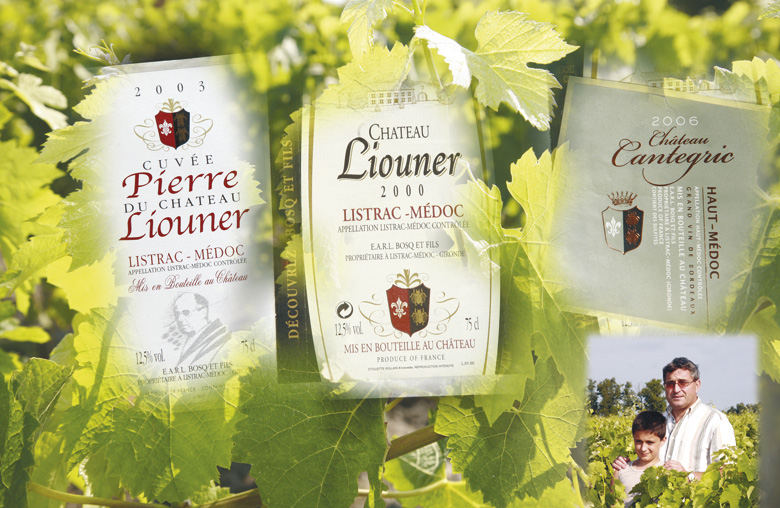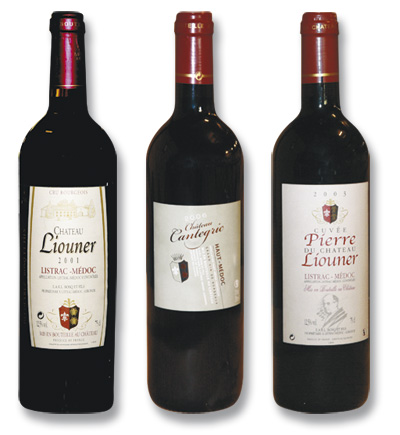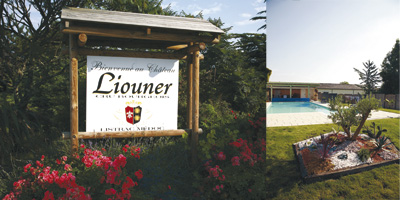Winegrower Bordeaux
Wine Tourism in the Médoc :
We met Pascal Bosq whilst he was still President of the Listrac-Médoc appellation, on 2nd April at a ‘futures’ tasting held in Bouliac and his satisfaction was clear. Solid, robust and fleshy, Listrac wines confirmed their standard of quality for 2007, which was nevertheless a difficult vintage. A source of pride for its producers, who this year again are having to be extremely cautious in order to protect their grapes from various vine diseases provoked by unstable weather conditions. The impact of climate change now evident in vineyards is causing concern for an increasing number of winegrowers keen to limit their use of chemical vine treatments. At Château Liouner, as elsewhere, protecting the environment now takes precedence over productivity, which was certainly a definite factor involved in the crisis Bordeaux wines experienced in 2004. Nature conservation and respect for the consumer preside over general considerations about production methods. Vine treatments are gradually being reduced to a strict minimum, and experiments are also being carried out to explore new techniques.
Cuvée Pierre, a prestige wine, is made in the finest vintages (3 000 to 5 000 bottles produced in 2001, 2003 and 2005). Selection of certain vine rows; yields of 35 hectolitres per hectare, hand-picked harvests, traditional wine-making methods (maturation for 24 months in new oak barrels)… It is a top-quality wine, made as a tribute to his father, Pierre Bosq, who died in 1999.
The first wine, Château Liouner, is a blend of Cabernet (50%), Merlot (40%) and Petit Verdot (10%), all of which come from the best plots of the vineyard. This wine is made traditionally, in stainless steel tanks, with a maturation period lasting for 12 to 15 months in oak barrels, of which 30% are new. Production (60 to 70 000 bottles a year) is sold exclusively to individual customers and wine shops.
The second wine, Château Cantegric (80 000 bottles a year), is aimed for individual customers and exports sales, as well as for hypermarkets and supermarkets. Fruity and modern, it is a pleasurable wine with which the estate hopes to appeal to a younger clientele.
Production of Château La Ruade, sold in bulk, has been stopped. In 2007, Pascal and Laurence Bosq planted half a hectare of Sauvignon Blanc on soil comprised of clay-limestone and Pyrenean pebbles. The first harvest is expected in 2009 and they hope to produce a top-of-the-range wine.
The estate also makes a Clairet (3 to 4 000 bottles a year), sold to individual customers and restaurateurs.
Overall, 48% of production is sold directly to individual customers (shows, fairs, restaurants, wine shops …), the remaining percentage is sold by Bordeaux wine merchants who deal with exports to Belgium, Denmark and Germany. As for events, Pascal and Laurence Bosq have taken part in the Agricultural Show in Paris for the past two years and never miss the shows held in Metz, Nantes and Laval and of course the Vinidôme exhibition in Clermont-Ferrand.


E.A.R.L. Bosq et fils
Château Liouner
33480 Listrac-Médoc
Tél : 05 56 58 05 62
Fax : 05 56 58 02 14
E-mail
Twice a year, Château Liouner opens its doors to the general public. Each year, at the end of November, 150 meals are served to customers who come to share the end of the grape harvests and learn more about wine. The estate’s oenologist, Marc Quertinier, explains the characteristics of each grape variety to visitors: Merlot, the predominant variety, brings fruitiness and powerfulness due to its fleshiness; Cabernet Sauvignon provides structure with its impetuousness…
At present, there is a feeling of a new era beginning at this estate: Pascal and Laurence Bosq are realising new ambitions for Château Liouner. “We intend to develop facilities to welcome visitors to the estate: meals, tastings, group visits. We truly wish to take an orientation towards wine tourism, showing distinct emphasis on the importance of terroir.” Traditional cuisine will be prepared by Laurence Bosq and activities will be proposed according to the different seasons of the year: participation in pruning, discovering regional produce and protection of the environment. Producers of Cognac, foie gras and other partners will also be associated with these activities, during events organised for the general public.
Pascal and Laurence Bosq are also looking into a project of opening a holiday home in the form of a wooden chalet located in the woods, which will be built on a plot of land that has been naturally re-wooded. “We’d like to recreate an atmosphere that evokes sheepfolds, resin collectors huts…” Pascal Bosq explains. The chalets will be made of maritime pine of course; heating and the construction of the chalet will naturally conform to ecological standards. This environmentally friendly attitude is fairly widespread in the region and is now combined with a new approach to vine growing.